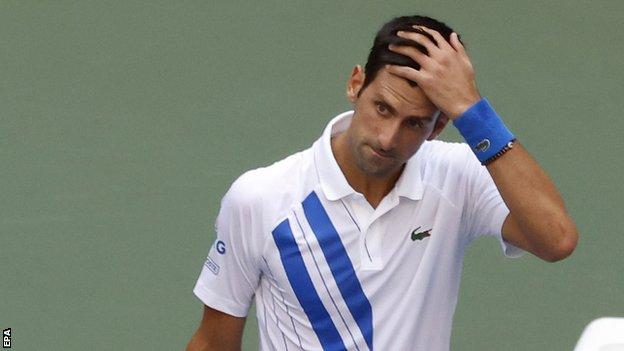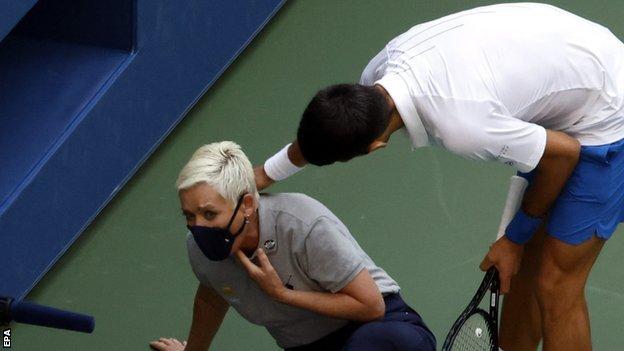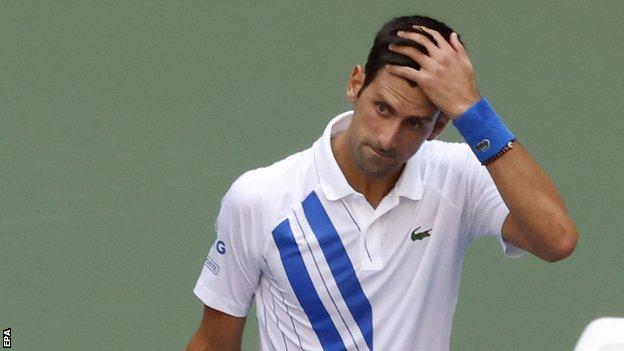Novak Djokovic must have known his US Open was over as soon as that tennis ball hit a line judge in the throat.
Tim Henman had to be disqualified when he accidentally hit a ball girl on the ear in a men’s doubles at Wimbledon in 1995; and so, too, did David Nalbandian when he kicked an advertising hoarding into a line judge’s shin in the Queen’s Club final of 2012.
The rules are clear and they must equally apply to the world’s number one male player.
Djokovic spent seven minutes trying to persuade US Open referee Soeren Friemel of the case for the defence. But having hit a ball “dangerously or recklessly within the court, or with negligent disregard of the consequences” – to quote the rulebook – there were no grounds for clemency.
In fact, a reprieve would have had far more serious repercussions for the sport, and left a stench of preferential treatment for the rich and influential.

The act was not intentional. Djokovic was not looking where he was aiming the loose ball, and yet that is part of the problem. On more than one occasion in recent years he has been oblivious to the welfare of others in the single-minded pursuit of success.
In a 2016 French Open quarter-final against Tomas Berdych, Djokovic’s racquet very nearly hit a line judge having slipped out of his hands after an angry swipe. And later that year, in a match against Dominic Thiem at the ATP Finals, he fired a ball towards his coaching team, who were sitting in a row immediately in front of spectators.
“It’s not an issue for me. It’s not the first time I did it,” was Djokovic’s reply when cross-examined later.
His apology – a genuine one, via Instagram, to the line judge and the US Open – would have been far better delivered in person before flying out of New York. He says he needs to “turn this all into a lesson for my growth and evolution as a player and human being”.
Read Also: History Rules Significant Football Players
Djokovic often speaks like this, but hopefully he will do just that.
What had been a perfect year on court – Djokovic had won all 26 of his matches before this ill-fated clash with Pablo Carreno Busta – had been far from plain sailing elsewhere.
The 17-time Grand Slam champion was the driving force behind the Adria Tour: the series of exhibition matches in the Serbia capital Belgrade and the Croatian city Zadar. Djokovic was one of four players to contract Covid-19 as social distancing was abandoned – on the tennis court, during friendly games of football and basketball, and at the nightclub which hosted an end of weekend party.
“We did it with a pure heart and sincere intentions,” Djokovic said in another apology on Instagram. But it was spectacularly ill-judged and did nothing to help tennis’ attempts to get the professional game up and running again.

Djokovic has also ruffled more than a few feathers with the formation of the Professional Tennis Players’ Association.
It has significant support among his peers, and has been long in discussion, but the timing again seems amiss. The inaugural meeting took place at Flushing Meadows on the eve of a US Open which is offering 91% of the usual prize fund, while losing the income of about 850,000 hungry and thirsty ticket holders.
Whether the attention focused on the new association, and the public opposition of both Rafael Nadal and Roger Federal, contributed to Sunday’s events in New York, only Djokovic himself might know.
But he fired a ball angrily into the advertising hoardings in the game before his disqualification. He had just squandered three break points, but was otherwise playing beautifully and did not look to be heading for a stressful afternoon.
The 33-year-old knows he had a golden opportunity to win an 18th Grand Slam this week, and his next opportunity -the French Open at Roland Garros – will not be made any easier by the presence of the 12-time champion Nadal.
But Djokovic has consistently overcome adversity in the past. He will recover; he will win again – just hopefully with a little more humility.
